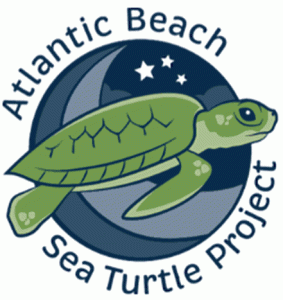About our group
The North Carolina Wildlife Resources Commission (NCWRC) began monitoring sea turtles on the Carolina coast in the 1980’s, leading to the creation of the sea turtle protection program in the 90s.
Five species of sea turtles, loggerheads, greens, leatherbacks, Kemp’s ridleys, and hawksbills, use the almost 330 miles of ocean-facing beaches of NC for nesting. Beaches that are not monitored by Park Rangers, universities, or military contractors are managed by volunteer groups. In 2008 NCWRC began looking for volunteer coordinators to help monitor sea turtle activities on Bogue Banks, and the Atlantic Beach Sea Turtle volunteer group was born.
The volunteer group stays between 60-80 members strong. Volunteers patrol the beaches on foot rain or shine from May 1 through August 31 looking for sea turtle crawls. They report any crawls or other sea turtle activity or threat (such as deep holes that can trap turtles or beach furniture that block nesting grounds) to volunteer coordinators.
After a mother sea turtle lays a nest, the eggs in the nest will incubate between 50-70 days. Volunteers start sitting with nests at day 50. The sitters sometimes have to sit (or at least periodically check the nest) from 7 pm to 7 am.
From 2003-2022 there have been 175 recorded sea turtle crawls in Atlantic Beach. Of those, 92 resulted in nests. From 2003-2014 all crawls were made by loggerheads, but in 2015, 2021 and 2022 Atlantic Beach had green sea turtle crawls (three resulted in nests). While most nests have on average 80-120 eggs, our 2022 green nest had 170 hatchlings! In 2020 the most endangered of all sea turtles, a Kemp’s ridley, laid a nest right here in Atlantic Beach.
Over the years our volunteer group has partnered on several sea turtle projects with universities such as Duke University Marine Lab and UNC Institute of Marine Sciences. One such project measured the light pollution on Atlantic Beach and compared it to other local beaches.
Light pollution for sea turtles is any artificial light that can be seen from the beach including ocean-facing porch lights, pathway lights, pool lights, flashlights, cell phones, and streetlights. The study found that AB has some of the highest light pollution per square area in North Carolina.
Hatchlings mainly use their sense of sight to orient towards the sea using the brighter horizon, normally the moon reflecting over the ocean, but light pollution causes the hatchlings to misorient. We’ve lost hundreds of sea turtle hatchlings over the years in Atlantic Beach due to light pollution. The two-inch-long hatchlings will crawl to a light source or continue to crawl in circles looking for the ocean until they fall prey to predators or succumb to dehydration.
This study and other light studies in Florida also revealed that light pollution causes a loss of suitable nesting habitat for sea turtles because nesting mothers will generally choose darker beaches over more lit beaches. This is why we have had more nesting mothers chose to nest on Ocean Ridge (a mostly darkened beach) over the Atlantic Beach Circle area. There have been rare nests close to the circle, however those hatchlings ended up in the street, run over in parking lots at the circle, and fell into the storm drains.
Our volunteer group has experimented with various shade-cloths over the years in an effort to shield the nests from the light pollution that causes such harm. The combination of the costly shade-cloths and our diligent all-night efforts have yielded the successful nests that we have had.
Atlantic Beach has also been part of the Northern Recovery Unit Loggerhead DNA Project since 2010. This is a multi-state genetic research project that works with the University of Georgia to individually identify nesting sea turtles. All sea turtles are protected species (ranging from threatened to critically endangered) and this project is helping answer nesting census questions.
From the project we have learned we have 37 unique DNA fingerprints (individual females) that have nested in AB from 2010-2022. In addition, we’ve learned that most sea turtles don’t nest every year (instead nest every 2-3 years), can lay 1 to 8 nests per season, and they don’t always come back and nest on the beach that they hatched from. We have had sea turtles in Atlantic Beach that also nest in Virginia, Georgia, and South Carolina. And we have other sea turtles that put ALL their nests between Pine Knoll Shores and Fort Macon.
Since the formation of the Atlantic Beach Sea Turtle volunteer group, it has been a dream of ours to form a nonprofit to work alongside the volunteer group to better serve the AB sea turtles. In 2021 the Atlantic Beach Sea Turtle Project, Inc. was formed.
The board’s first major undertaking was to obtain funding and purchase a UTV we could use on the beach to haul the shade-cloths and other equipment on the beach. We also wanted to use the UTV for nest response and sea turtle strandings. We accomplished this huge feat this summer.
The nonprofit’s goals are to help mitigate the threats sea turtles face in Atlantic Beach. We plan to maintain a website that will serve as an educational outlet to our public and communicate ways people can help sea turtles. Filling in beach holes, picking up trash, removing beach furniture at the end of the day, and turning off or shielding lights are just few simple ways people can help sea turtles across North Carolina.
The number one cause of death for sea turtles in Atlantic Beach is light pollution, so the nonprofit’s next objective will be to begin work on reducing light pollution in the area.
With the use of proper lighting practices and awareness, the goal of having safely-lit pathways for people while also creating safer nesting areas for sea turtles is achievable. Turning off unnecessary lights (ones not used for safety), changing bulbs to low-pressure sodium-vapor lighting, using turtle-safe lighting, tinting windows, closing curtains, using light shields, using knee-high pathway lights versus a single 14-foot-high flood-light pointed at the ocean, are a few simple, safe, yet effective lighting changes.
If you have ever been to an area retrofitted with sea turtle-friendly lights, like in South Carolina or Florida, your ability to see at night is remarkably better with amber light versus white light that blurs your night vision. Our nonprofit wants to help with these retrofits and make our beaches more enjoyable and safer for humans and turtles.
We know this is a massive undertaking, and we have to continue to protect the nests with all-night nest sitting and shade-cloths. We are currently testing a prototype shade-cloth designed by volunteers, built by REI, and funded through the Triad Foundation.
While the shade-cloths are not a permanent or reliable solution, we hope they will buy us the time we need to implement real solutions to lessen impacts on sea turtles as well as other wildlife that use our beautiful beach habitat to survive.
With the utmost respect,
Michele Lamping
Atlantic Beach Sea Turtle Volunteer Coordinator
Atlantic Beach Sea Turtle Project, Inc. President
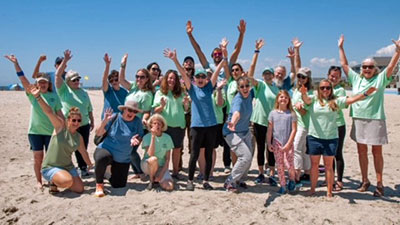
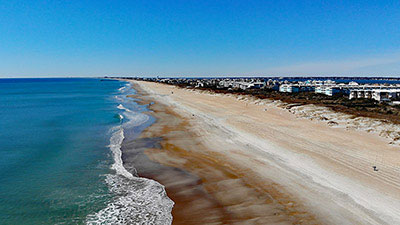
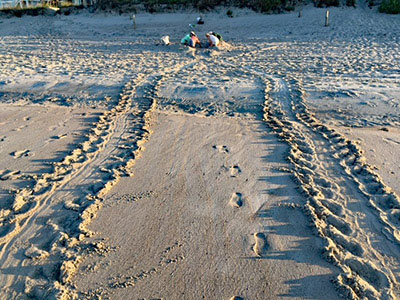
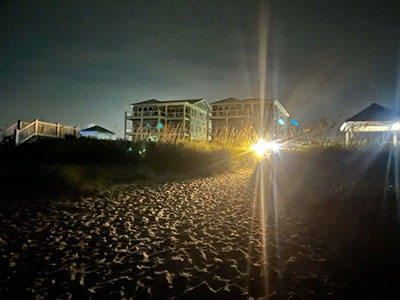
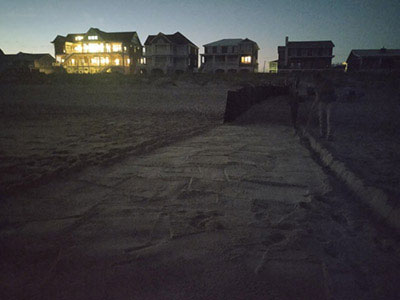
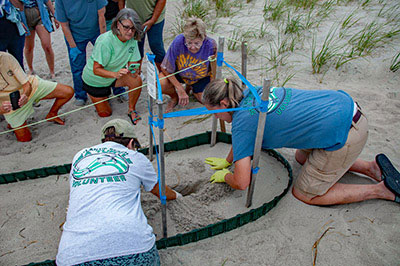
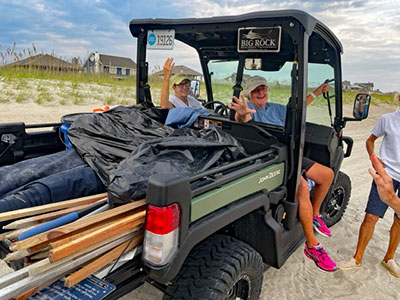
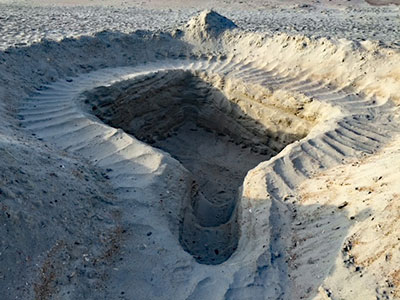
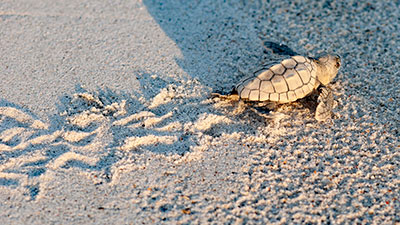
To Report a North Carolina Sea Turtle Stranding Emergency
Stranding Hotline: 252-241-7367
To Report Sea Turtle Nest Violations
Call NCWRC Hotline: 1-800-662-7137
